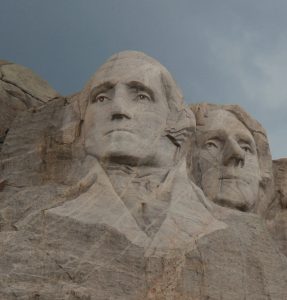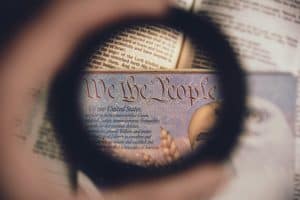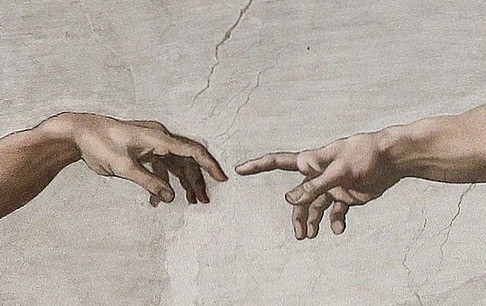— Made in God’s Image, a 10-Part Bible Study Series —
What exactly does being made in God’s image mean? What are some of the practical implications?
An overview of this Bible study series is available here.
This article introduces part 2.
A teaching plan for part 2 is available here.
Part 2 — Like God: Human Beings Are Special Because God Made, and Makes, Them in His Image
Last time we listened in on a conversation between Alan Wilson and his pastor, Matt Thomas. Alan was trying to sort through the challenges to his faith he’d faced during his first semester in college. Pastor Matt helped him see that even though many people today claim that a belief in right and wrong is “religious” and therefore not valid in the real world, a belief that right and wrong don’t exist is just as religious.
Even though many people today claim that a belief in right and wrong is “religious” and therefore not valid in the real world, a belief that right and wrong don’t exist is just as religious.
Neither of these positions, or the worldview of which it is a part, can be proved beyond a shadow of a doubt. The question is, Which worldview is evident beyond a reasonable doubt? While a belief in absolute truth has theistic implications, one that denies absolute truth and a fixed set of moral standards has atheistic implications. Again, both of these are faith-based presuppositions.

Many elements set the biblical worldview apart from other belief systems, but two that are especially significant are
- the God of the Bible exists, and
- He created, and creates, human beings in His own image.

Last time, against the backdrop of Alan Wilson’s struggles, we considered God’s existence. For the moment, our focus was not on what the Bible teaches about His many attributes, but we did say His existence and His being the source of human life makes people accountable to Him. Indeed, being made in God’s image obligates every individual to his or her Creator. How else are human beings unique? Keep reading!
As we soon will see, the many qualities that set human beings apart from the animal and plant kingdoms have a great deal to teach us.
Join me as we embark on a remarkable journey of discovery.
Element Two: People Are Special Because God Makes Them in His Image
With the previous post as background information, I’d like to focus now on what it means for human beings to have been made in God’s image, or, in Latin, the imago Dei. Genesis 1:26-28 informs us,
26 God said, “Let Us make man in Our image, according to Our likeness; let them have dominion over the fish of the sea, over the birds of the air, and over the cattle, over [a]all the earth and over every creeping thing that creeps on the earth.” 27 So God created man in His own image; in the image of God He created him; male and female He created them. 28 Then God blessed them, and God said to them, “Be fruitful and multiply; fill the earth and subdue it; have dominion over the fish of the sea, over the birds of the air, and over every living thing that [b]moves on the earth.”
The principle that God has made, and makes, people in His image does a great deal more than set people apart. It also carries implications for how individuals, groups, and even governments should regard and treat God’s highest creation.
Theologian and pastor James Montgomery Boice says the imago Dei means

that men and women possess the attributes of personality, as God himself does, but as the animals, plants, and matter do not. To have personality one must possess knowledge, feelings (including religious feelings), and a will. This God has, and so do we. We can say that animals possess a certain kind of personality. But an animal does not have reason as men do; it only reacts to certain problems or stimuli. It does not create; it only conforms to certain behavior patterns, even in as elaborate a pattern as constructing a nest, hive, or dam. It does not love; it only reproduces. It does not worship. Personality, in the sense we are speaking of it here, is something that links man to God but does not link either man or God to the rest of creation.1

These observations, as helpful as they are, only begin to scratch the surface. Dr. Boice goes on to mention the connections human beings have to morality and spirituality as well. Like personality, these also are found only in the human family; not in animals or plants.2
Three Basic Approaches

Let’s take a step back and look at this issue a bit more broadly. Summit Ministries President Jeff Myers explains that over the years, theologians and scholars have developed and taught three basic perspectives on the meaning of imago Dei. Here is a summary of his explanation.
- Having been made in God’s image, we resemble Him, although not physically, for God is spirit. This does not mean we are godlike, but that we are like God in significant ways that also make us distinct from animals. We have the ability to communicate with words in both verbal and written forms, as well as the capacity to think and reason. We are emotional creatures capable of experiencing a wide range of feelings. Also, we have decision-making abilities, and we have an innate sense of morality and ethics. Because these traits primarily are descriptive of who we are rather than actions we take, this perspective often is called an ontological view.
- As human beings, we are capable of engaging in relationships; we have the ability to relate to one another. This alludes not only to God’s relating to us, but also to our our reflecting His relational nature within the triune Godhead itself.
- Men and women also have the ability to rule. Genesis 1:26-28 declares that the Lord blessed the first man and woman, “and God said to them, ‘Be fruitful and multiply; fill the earth and subdue it; have dominion over the fish of the sea, over the birds of the air, and over every living thing that moves on the earth.'” Thus, an important way in which we bear God’s image is in our exercise of appropriate authority.
Notice how, as we have considered these explanations of being made in God’s image, we have moved from an emphasis on being to an emphasis on doing. Note also that these three perspectives aren’t contradictory but are quite compatible. We reflect God’s image in both our innate qualities and in the actions we take to fulfill appropriate roles and responsibilities.3
True in the Real World
The uniqueness of human beings in the biblical worldview stands contrary to the belief and the belief system that all there is resulted from material and random forces over many eons. We do well to take note of what we see when we look around us. What do our observations tell us? We see that indeed, human beings are unique and special in countless ways consistent with biblical teaching. During the Bible study session, we will consider more than two dozen traits that set human beings apart from the rest of God’s creation. For now, let’s look at seven specific categories, each of which reflects the image of God in men and women, boys and girls. Even though some of these qualities overlap with items we’ve already mentioned, our discussion will continue to uncover new insights.

Human beings have the capacity to
-
- create,
- communicate,
- contemplate,
- initiate,
- relate,
- administrate and delegate, and
- appreciate.
Again, people are not godlike, but they are like God in these and many other ways — ways all the members of the rest of His created order are not. These traits and categories of traits testify that the Creator has designed and fashioned human beings so that they reflect His nature. There are limits, of course. People possess knowledge, but only God is omniscient. Human beings can exercise their limited authority, but only God is omnipotent. Moreover, while people have an innate sense of right and wrong, God alone is holy in the absolute sense.

There’s more. People have the capacity to choose to obey God or to disobey Him. Thus, we should note that traits that set people apart from the rest of God’s creation can be utilized in ways consistent with God’s will (consider Noah) or in ways inconsistent with it (as with the effort to build the Tower of Babel). In the book of Jonah, we see Jonah at various times exercise several of the seven traits named above both in resistance to and in compliance with God’s direction. The point here is that even when people don’t believe in God and even when they resist Him directly, they still demonstrate that they are made in His image.
Remember that during Session 1 of our Bible study, we cited the inconsistency of atheist Madelyn Murray O’Hair’s push for a hospital over a church and charitable deeds over prayers said. However, as we noted, without God, the notion of charitable deeds, or good actions over bad ones, is nonsense. Even hard core atheists demonstrate that they are made in God’s image. In their efforts to oppose God, they cite moral and ethical values that could have come only from Him in the first place. It’s reminiscent of this insightful story: An devout elderly woman lived alone, but consistently demonstrated a strong faith in God.
The old woman had a neighbor who was an atheist who was rather fond of mocking the old woman of her spirituality. The old woman went into financial difficulties one day. As she was praying in her house for God to come to her aid, the atheist thought of a plan to mock the old lady for her belief. He bought groceries, and left them outside the door of the old woman’s house. Then, he knocked a few times on the door, and quickly went to hide behind a bush and observe what happen. The old lady opened the door, and upon seeing the groceries, gave praise verbally to God for what she thought was an act of divine providence. The atheist neighbor sprang up to his feet, and remarked, “Aha! You silly woman, it was me who placed the food there and not God.” The old lady was undeterred and sang even more praise, saying “Praise God for providing, and even making an atheist pay for it!”
God’s Image and the Cultural Commission
Let’s return to Genesis 1:26-28.
- In verse 26 we learn of God’s intention to create human beings in His image.
- In verse 27 we are informed that He did, and does, make people — both male and female — in His image.
- In verse 28 we read God’s blessing on humanity through the first married couple and of the assignment He gave them to “Be fruitful and multiply; fill the earth and subdue it; have dominion over the fish of the sea, over the birds of the air, and over every living thing that moves on the earth.”
We would make a mistake if we failed to consider the meaning of imago Dei without taking into account the assignment God gave the first man and woman (and consequently every other human being as well) in verse 28, an assignment that has been appropriately called “the cultural commission.”
 In their landmark book How Now Shall We Live? Charles Colson and Nancy Pearcy contend that when God gives the directive we see in Genesis 1:28 to Adam and Eve on the sixth day of creation, He essentially passes the baton of work in the world to the human agents He has created. It is not His intention to abandon His creation or the people who are in it, for He still will be involved with them in a variety of ways. A great deal of social and cultural work now must be done to maintain the created order, but now, people will accomplish this work. The specific tasks involved relate directly to the God-given responsibilities of having dominion over creation and filling and subduing the earth.
In their landmark book How Now Shall We Live? Charles Colson and Nancy Pearcy contend that when God gives the directive we see in Genesis 1:28 to Adam and Eve on the sixth day of creation, He essentially passes the baton of work in the world to the human agents He has created. It is not His intention to abandon His creation or the people who are in it, for He still will be involved with them in a variety of ways. A great deal of social and cultural work now must be done to maintain the created order, but now, people will accomplish this work. The specific tasks involved relate directly to the God-given responsibilities of having dominion over creation and filling and subduing the earth.
While sin has entered the world since God gave the command we find in Genesis 1:28, the tasks of human beings remain essentially the same. Couples still bear children and rear them in the context of family. People still plant and tend crops and raise animals for food and to perform needed services. They form and maintain neighborhoods, communities, cities, and nations. They also engage in creative endeavors by writing and performing music, producing works of literature, making films, and creating works of visual art.4
In other words, the fall did not wipe out God’s cultural directive. Furthermore, Christians, more than any other group of people, can demonstrate that sin doesn’t have to overshadow it.5 Humanity’s fall into sin marred but did not eliminate God’s image in each person. As people fulfill the command of God in Genesis 1:28, they demonstrate what it means to be human, to be made in His image. Yet, as believers fulfill this command, they demonstrate what it means to be made in God’s image and in a right relationship with their Creator.
Applying the Biblical Worldview
Thus far, we’ve explored the biblical truths that God exists that the Creator made human beings in His own image. Although they wouldn’t have described these tenets exactly as we have described them here, the Founders of the United States of America recognized these two elements of the biblical worldview, took that worldview seriously, and applied it in practical ways when they founded the United States of America as a new nation. We see this so clearly in the Declaration of Independence, which was drafted and adopted in 1776.
We hold these truths to be self-evident, that all men are created equal, that they are endowed by their Creator with certain unalienable Rights, that among these are Life, Liberty and the pursuit of Happiness. — That to secure these rights, Governments are instituted among Men, deriving their just powers from the consent of the governed, — That whenever any Form of Government becomes destructive of these ends, it is the Right of the People to alter or to abolish it, and to institute new Government, laying its foundation on such principles and organizing its powers in such form, as to them shall seem most likely to effect their Safety and Happiness.

The early leaders and statesmen of the new nation—George Washington and Thomas Jefferson among them—understood that the human race truly is great, but fallen and imperfect. Not all were Christians, but virtually all held to a Christian perspective on life and the world.
With the Declaration of Independence and the Constitution with its Bill of Rights soon thereafter, the Founding Fathers wove into the fabric of the new republic an official recognition of people as creatures of inherent dignity and worth originating from the Creator God. Yet they also crafted a government with checks and balances to prevent those in authority from attaining too much power. They knew that, like liquor, too much power can and will overwhelm and corrupt even well-meaning men.
Rights and Responsibilities
Therefore, the Founders didn’t just affirm rights, but also responsibilities. Let us not miss the truth that free market capitalism was foundational to the freedoms the new government was charged to protect. This isn’t a popular concept today, because capitalism is vilified, maligned, and extremely misrepresented and misunderstood. Yet, even before the United States officially existed, American settlements validated the virtues of a free market economy.
While many believe government exists to meet people’s needs, Scripture teaches individual responsibility. So does history. Settlers in both Jamestown and Plymouth initially sought to produce food and wealth according to a communal system. Workers contributed the fruits of their labors to a “common store” on which all relied. This approach pushed both settlements to the brink of starvation. Yet when land was assigned and people could reap the benefits of their own work, the communities prospered.
The Bible commends reward for hard work among able-bodied people. Proverbs 14:23 says, “In all labor there is profit.” Paul told the Thessalonians that whoever wouldn’t work shouldn’t be allowed to eat (see 2 Thess. 3:10), and he told Timothy that “if anyone does not provide for his own,…he…is worse than an unbeliever” (1 Tim. 5:8). It isn’t government’s job to meet the people’s needs. That job belongs to the people themselves.
Americans, and especially Christians, must rediscover and uphold these virtues, including the benefits capitalism affords every citizen. It endows both producers and consumers of goods and services with both privileges and expectations, rights and responsibilities. Both of these are consistent with the biblical view of humanity as great and capable of great things (for God made people in His image), but fallen and in need of personal “checks and balances.”
For more information on capitalism, please take time to watch these four concise yet highly informative videos from Prager University.

Not Just About Salvation
America’s Founders obviously didn’t apply biblical principles perfectly. Slavery was a part of the fabric of life during that era, and it would continue in the United States for nearly a century longer. Even so, even when the nation started, the Founders laid the groundwork for the eventual elimination of slavery.6 More to the point here, with the Declaration of Independence and the US Constitution, they affirmed the God-given rights of the people and established that government’s role was to protect and maintain those rights.7 This was profound, especially for that era! We must understand that it was and is rooted in a Judeo-Christian perspective, one that Christians need to rediscover and apply today.
Christianity, you see, isn’t just about establishing and living in a right relationship with God.
It’s about everything else as well — including about God’s creating human beings in His image.
Copyright © 2024 by B. Nathaniel Sullivan. All rights reserved.
Related article: The High Cost of Denying the Obvious, Part 2: God Speaks Clearly Through Nature
Notes:
1James Montgomery Boice, Genesis: An Expositional Commentary, Vol. 1, Genesis 1:1–11:32, (Grand Rapids: Zondervan, 1982), 77-78.
2Ibid., 78.
3Jeff Myers, Understanding the Faith: A Survey of Christian Apologetics, (Colorado Springs, CO: David C. Cook, 2016), 196-197.
4Charles Colson and Nancy Pearcey, How Now Shall We Live? (Wheaton, IL: Tyndale, 1999), 295. In Colson’s and Pearcey’s own words,
The scriptural justification for culture building starts with Genesis. At the dawn of creation, the earth is unformed, empty, dark, and undeveloped. Then, in a series of steps, God establishes the basic creational distinctive: light and dark, “above the expanse” and “below the expanse,” sea and land, and so on. But then God changes his strategy.
Until the sixth day, God has done the work of creation directly. But now he creates the first human beings and orders them to carry on where he leaves off: They are to reflect his image and to have dominion (Gen. 1:26). From then on, the development of the creation will be primarily social and cultural: It will be the work of humans as they obey God’s command to fill and subdue the earth (Gen. 1:28).
Sometimes called the “cultural commission” or “cultural mandate,” God’s command is the culmination of his work in creation. The curtain has risen on the stage, and the director gives the characters their opening cue in the drama of history. Though the creation itself is “very good.” the task of exploring and developing its powers and potentialities, the task of building a civilization, God turns over to his image bearers. [Accordingly, he gives them the cultural commission in Genesis 1:28].…
The same command [of Gen. 1:28] is still binding on us today. Though the Fall introduced sin and evil into human history, it did not erase the cultural mandate. The generations since Adam and Eve still be children, build families, and spread across the earth. They still construct cities and governments. They still make music and works of art.
5Ibid.
6Please see the Word Foundations series The Importance of Getting History Right: Uncovering the Truth About Racism at the Founding of America and Beyond. Also see “Discover Liberty.”
7Please see the Word Foundations series Misinformed and Misled: How a Distorted Perspective on Rights Is Leading America Into Tyranny.
Unless otherwise indicated, Scripture passages have been taken from the New King James Version®. Copyright © 1982 by Thomas Nelson, Inc. Used by permission. All rights reserved.
top image: Photo by Clem Onojeghuo on Unsplash
This article has been adapted from “Two Distinctive Elements of the Christian Worldview, Part 1: Human Beings Are Special.” The article originally was published on August 11, 2018 and is available here.


Be First to Comment